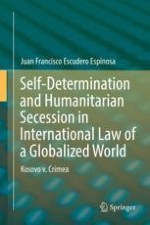2017 | OriginalPaper | Buchkapitel
7. The International Community Faced with Illegal Secessions by Sub-State Units
verfasst von : Juan Francisco Escudero Espinosa
Erschienen in: Self-Determination and Humanitarian Secession in International Law of a Globalized World
Aktivieren Sie unsere intelligente Suche, um passende Fachinhalte oder Patente zu finden.
Wählen Sie Textabschnitte aus um mit Künstlicher Intelligenz passenden Patente zu finden. powered by
Markieren Sie Textabschnitte, um KI-gestützt weitere passende Inhalte zu finden. powered by
